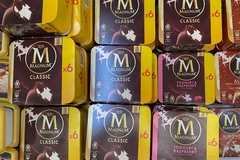
- Industry news
Industry news
- Category news
Category news
- Reports
- Key trends
- Multimedia
- Journal
- Events
- Suppliers
- Home
- Industry news
Industry news
- Category news
Category news
- Reports
- Key trends
- Multimedia
- Events
- Suppliers
EU audit reveals food security was maintained during COVID-19 but flags market distortions

21 Apr 2023 --- The EU helped ensure food could arrive to families across the bloc during the COVID-19 pandemic, a report by the European Court of Auditors (ECA) finds. However, the emergency allocation of funding, which amounted to €712 million (US$780.22 million), allowed some farmers to be overly compensated and others under-compensated; furthermore, in some sectors, like the wine industry, overly complex solutions lead to inefficient money spending.
Moreover, the auditors highlight that support would be more effective if it provided targeted aid to those sectors and farmers in need, as nine of the 14 member states that used EU direct funds targeted the agricultural sector and supported beneficiaries irrespective of whether they had suffered losses.

Nonetheless, the auditors conclude that the response to the threat posed to agricultural product supply chains was “appropriate in most respects but insufficiently targeted.”
The pandemic and preparing for future crises
COVID-19 impacted the agricultural product supply chain from farm to fork, leading to emergency measures such as direct support to farmers, state aid facilitation and exceptional market intervention measures. Furthermore, the EU introduced measures to ensure the supply of supermarkets and to qualify seasonal workers as critical.
ECAs report aims to prepare the EU for future crises while not making any specific recommendation. The body hopes the European Commission can improve the design of future emergency responses.
 Wine storage is flagged by ECA as a cheaper alternative to processing alcohol into fuel or for industrial use.The report has been released amid a grain supply chain crisis in Eastern Europe, where Ukraine’s foodstuffs have flooded markets and created damaging market distortions.
Wine storage is flagged by ECA as a cheaper alternative to processing alcohol into fuel or for industrial use.The report has been released amid a grain supply chain crisis in Eastern Europe, where Ukraine’s foodstuffs have flooded markets and created damaging market distortions.
Joëlle Elvinger, the ECA member who led the audit, reveals to FoodIngredientsFirst, that a similar report on the Ukraine War disruptions on agriculture supply chains can be expected “by Q3 or Q4 2024.”
“Unfortunately, this is not a one-off event: the Russian war in Ukraine has also posed a significant challenge to the security of our food supply,” she underscores.
Overspending on wine
The initial pandemic supply disruptions lead wine producers to have large amounts of wine in storage. Some countries that accessed the EU funds opted for crisis distillation, where wine is withdrawn from the market to rebalance it and avoid prices from falling excessively.
Crisis distillation allows for wine to be processed into alcohol for industrial use or fuel, with the EC providing €293 million (US$321.03 million) for this expenditure.
The auditors analyzed the cases of France, where €208 million (US$227,93 million) – of which €127 million (US$139,17 million) was EU funding – was used to distill 2.6 million hectoliters of wine.
Another option would have been to store the wine. Wine storage cost France €52 million (US$57 million) – of which €13 million (US$14.25 million) were EU funding – for 5.5 million hectolitres.
Per hectoliter, choosing distillation over storage costed eight times more.
Furthermore, storing the wine would have allowed to mitigate the effects of the poor harvest in 2021.
“Crisis distillation was much more costly than private storage where storage infrastructure was already in place,” remarks Elvinger.
Balancing farmer payments
Elvinger explains that EC authorities need to look at “unfair competition” created with the emergency payments and to consider requiring a “ceiling in allowed direct support to create some level of assurance and avoid subsidy raises.”
One of the spotlighted cases that show the disparities in funding allocation was the case of the flower sector in Spain and the Netherlands. Spanish goat farmers were monetarily overcompensated by over US$11 million.
Spanish goat farmers were monetarily overcompensated by over US$11 million.
The Netherlands has a share of 32% of all the flower production value, compared to the 14% of Spain, and allocated more public funds for the sector. However, in a disproportionate manner, since it committed €600 million (US$657.26 million) for the €10 million (US$10.95 million) of Spain.
This is 27.25 times more in percentage of state aid of the production value – 8.72% for the Netherlands compared to 0.32% for Spain.
“This difference in support to a sector has the potential to create unfair competition,” reads the ECA’s report.
At the same time, direct support “did not sufficiently target those in greatest need.”
Many EU countries supported farmers in a given sector “irrespective of whether they suffered losses.” As a result, some farmers could have received support even though they were unaffected by the crisis.
For example, In Spain, the Andalusian Rural Development Program estimated the sheep and goat sector to have lost €8.6 million (US$9.42 million), but the sector got €8.7 million (US$9.53 million) in support from EU funds and a further €10 million (US$10.95 million) in national aid.
To avoid this, cross-checks of aid beneficiaries from national and EU schemes could be implemented. Elvinger explains that the best acting and more efficient member states should share their good practices with others.
“In the future, the EC should include in its legislative proposals clear and objective rules without discriminatory criteria,” she concludes.
By Marc Cervera










